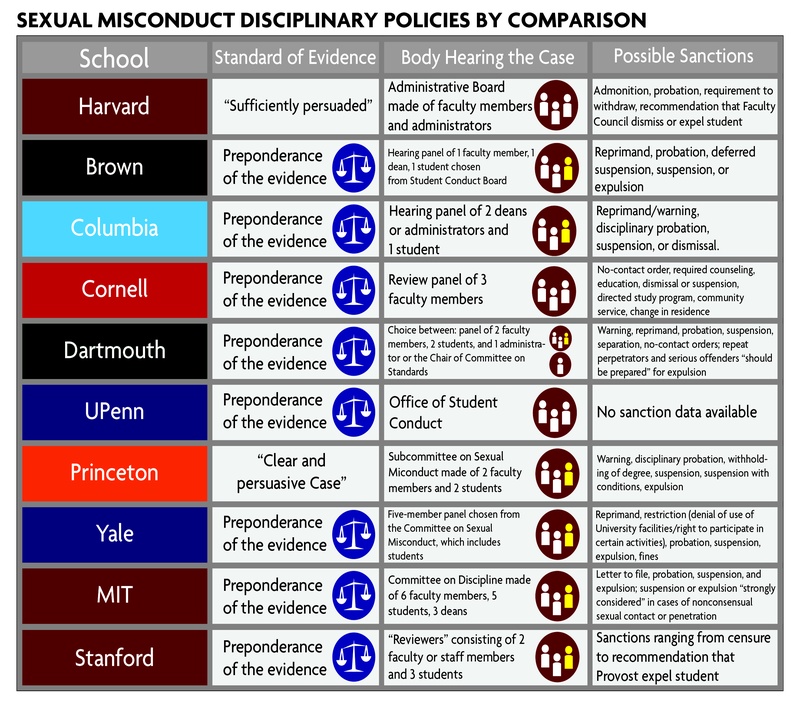The Boston Globe reports on “the Letterwriter,” a female Harvard student who wrote a letter to the Crimson detailing an episode of alleged sexual assault.
“I was intoxicated, I was in pain, I was trapped between him and the wall, and I was scared to death that he would continue to ignore what I said. I stopped everything and turned my back to him, praying he would leave me alone. He started getting impatient. ‘Are you only going to make me hard, or are you going to make me come?’ he said in a demanding tone.”
It did not sound like a question. I obeyed.”
Oh, man. I hate this stuff. Because from the description given, this is hardly a clear-cut situation. She’s drunk, he’s aggressive—maybe—she turns her back to him, he says something vulgar, she “obeys.”
There’s a lot of ambiguity in this recounting, and a frustrating lack of specificity. (“I obeyed.”) There’s also an attempt to write the story artfully, almost breathlessly, rather than literally; “It did not sound like a question. I obeyed.” (Wasn’t that in 50 Shades of Grey?)
Do you think this story would win a conviction in a court of law? She’s drunk, she “stumbles” into his dorm room, and something happens. I’m not saying she isn’t telling the truth, or at least what she believes to be the truth, but—there’s not a lot to go on here, evidence-wise.
And this is the crux of the matter: By the woman’s own admission, there is a huge amount of doubt about what happened that night. If the guy ever had to defend himself before some sort of interlocutor, presumably he’d say, “I was in my room, she came in to my room, she was a little tipsy, we fooled around by mutual consent.” The only claims we know to be true are the first three.
The original letter contains both more specificity and more ambiguity. The description of what happened is more specific, but the writer characterizes the event as “pressured me into sexual activity” and “sexually assaulted,” which I think are not the same, because “pressured” and “assaulted” do not mean the same thing. But people disagree on that, I’m sure; it’s a grey area that I suppose depends on what the woman really means by the term “pressured.”
Rightly or wrongly, the Letterwriter doesn’t seem to think that legal standards should apply; instead, she decries what she terms a “broader rape culture” that leaves victims of sexual assault with few good options. As the Globe describes it (emphasis added),
The Letterwriter continues to say Harvard took an “innocent until proven guilty” approach following her request to have her assailant moved to another residence House on campus. The formal investigation would follow the aforementioned definitions of rape and assault. The school suggested, “[in] an attempt to comply with Title IX regulation—which requires universities to provide a safe environment to survivors of sexual assault,” that Letterwriter should move to a different house herself. Letterwriter decided that moving would have given a sense of vindication to her assailant and decided to stay in her residence, with friends and tutors she believed would support her and prevent her from “descending into mental illness.”
Two things: First, it’s fascinating that the student in question appears to be offended that Harvard takes an innocent until proven guilty approach.
Second, if Harvard really did suggest that she move, that suggestion seems on its surface wrong. But I can imagine a scenario in which Harvard says, “Look, we haven’t yet proved that the guy did anything, and it isn’t going to be easy to prove that, so we can’t force him to move, so if you want to pursue it we will and in the meantime if you’re uncomfortable we can move you.”
I say this partly because that scenario seems more plausible than the description of rank insensitivity; with all the attention paid to sexual assault cases on campus these days (and rightly so), administrators who handle these matters know that their actions are likely to be closely scrutinized. And so they are careful. I can imagine that caution can translate into the appearance of insensitivity to a young woman who believes she has been sexually assaulted, but the university does have an obligation to be sensitive to all parties involved. Innocent until proven guilty, etc.
The Letterwriter argues that because Harvard’s policy on sexual assault contains obsolete 20-year-old language, her alleged assailant is getting away with his “assault.” She is also devastated by “seeing how university officials refuse to validate how upset you are.”
The last time I met with my resident dean, I told my dean about my depression, and how I thought it had been caused by the lack of validation and empathy I had received from the Harvard faculty. I said that it would be immensely helpful for me to know that my dean, not as a school official but as a human being, understood my pain and empathized with it. I asked my dean to take a step back from the situation and to admit that I had not been served well by the Harvard system. My pleas were met with a refusal to comment and an argument that it was not an administrator’s role to criticize Harvard’s sexual assault policy.
I feel bad for the dean in this scenario. First, he or she may not agree with the student. Second, anything he or she might have said, no matter in what “human being” context, could subsequently have been used against him/her and Harvard in any potential lawsuit. (Because you know that if the woman decided to sue, the fact that the remark was made “as a human being” wouldn’t keep her from using that comment as evidence of Harvard’s malfeasance.)
Unfortunately, it’s very hard to tell from a one-sided account what really happened here. Was this sexual assault? Where Harvard administrators insensitive? Did Harvard “win”?
You just can’t say.
So I suppose this post is a caveat to the inevitable outpouring of support for the Letterwriter and praise for her “courage.”
I’ve made this point before, but I think it bears repeating: Since when is writing an anonymous letter courageous? You know what’s courageous? Saying something difficult and putting your name to it.
“Harvard’s staff needs better training,” writes a woman in Slate.
And here’s a Harvard student named Grace Mahoney on Time.com: “’There’s a lot in the [Harvard] culture that’s very male-dominant,” she said, adding that tough academic standards pressure students to put on a brave face.
Snookums.
(Was that male-dominant? Sorry.)
Note the student’s connection here of a male-dominant culture and tough academic standards and a “brave” face; this is not exactly leaning in.
The headline on that Time piece: “Harvard Student: School Made Me Live with Attacker after Sex Assault,” which is highly misleading. (Sigh: Web journalism.)
“Read the Devastating Letter by a Harvard Sexual Assault Survivor,” says Mother Jones.
And so it goes.
The Globe article itself is a lousy piece of journalism—not even close to objective, and there’s no sign that the author, a woman, tried to speak with anyone in Harvard officialdom (they can’t talk, but still, you have to make the calls), and there’s no acknowledgement of the fact that Harvard is legally required to protect the confidentiality of this person and therefore can’t say a word in order to do the right thing. It is legally incapable of defending itself.
As always seems to be the case in these matters, the “truth” is hard to know, and if anyone does know it, it certainly isn’t going to be me or you or any of the thousands of other people who read the Letterwriter’s story.
I just wish we—and journalists in particular—could acknowledge this uncomfortable fact before rushing to judgment. And also that Harvard not be lambasted for, apparently, doing just that.


